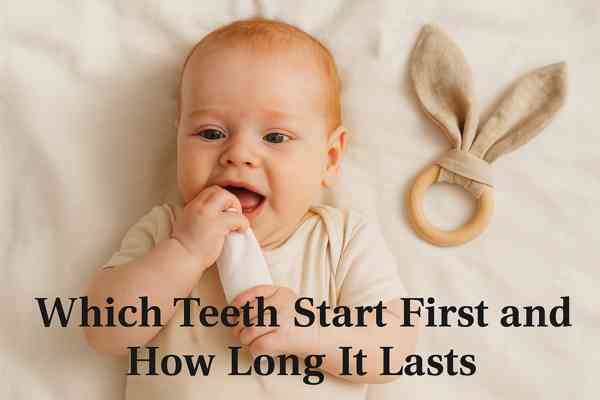10-Week-Old Teething: Signs, Symptoms, and Solutions
Most babies start teething between four and seven months old, but some teething babies begin as early as ten weeks. Early baby teething is completely normal and simply means your baby’s teeth are developing faster than average. Around this stage, parents might notice extra drooling, a constant need to chew on fingers or toys, and small bumps forming under the gums.
Understanding Early Teething
![]()
A 10-week-old teething baby may seem unusual, yet it often reflects healthy development. Timing is influenced by genetics, nutrition during pregnancy, and general health. While teething symptoms include fussiness, drool, and chewing, they should not cause a high fever, diarrhea, or rashes. If such signs appear, it’s best to consult your pediatrician to ensure your child is well.
At this young age, parents can start establishing gentle oral-care habits. Wiping the gums after each feeding keeps the mouth clean and helps babies get used to future brushing. The earlier comfort and hygiene begin, the smoother the upcoming teething months will feel.

Recognizing Teething Symptoms and Signs
![]()
Understanding baby teething symptoms helps identify when teeth start forming. Common early teething symptoms include:
- Excessive drooling or bubble blowing
- Frequent chewing on hands, toys, or clothes
- Red, tender, or swollen gums
- Brief irritability and increased crying
- Short naps or waking more often at night
- Changes in feeding rhythm—sometimes shorter or more frequent sessions
These signs can appear several weeks before a tooth breaks through. Some babies barely notice discomfort, while others show clear pain and restlessness for a few days. Every child experiences teething differently.
A handy way to test gum soreness is to gently rub the gums with a clean finger—if your baby bites down or seems soothed, teething is likely underway. Keeping drool-soaked bibs changed and skin dry prevents irritation on the chin and chest during these early weeks.
Which Teeth Start First and How Long It Lasts
![]()
The central incisors—the lower front pair—are typically the first teeth to erupt, followed by the upper central incisors and then the lateral incisors. Though the usual age range is later, early starters can begin much sooner.
| Tooth Type | Average Eruption (Months) | Role |
|---|---|---|
| Lower central incisors | 6–10 | Cutting early solid foods |
| Upper central incisors | 8–12 | Chewing and pronunciation |
| Upper lateral incisors | 9–13 | Tearing small pieces of food |
| Lower lateral incisors | 10–16 | Supporting bite alignment |
Once the gums begin to swell, a tooth can take one to two weeks to emerge. Some babies show teething behavior off and on over several months. Teeth usually erupt in pairs, and new teething symptoms often subside for a while after each breakthrough.

Soothing Teething Pain and Supporting Comfort
![]()
Chilled Teething Ring
Offer a BPA-free teething ring that’s been chilled—not frozen. The cool surface reduces gum inflammation and helps relieve teething pain. Keep multiple teething rings clean and rotate them during the day.
Gentle Gum Massage
Wash your hands and gently rub your baby’s gums with a clean finger for about a minute. The light pressure provides immediate relief and can calm your child before naps or bedtime. Massaging also improves blood flow in the gums, encouraging faster eruption of the first teeth.
Feeding Adjustments
During teething, the gums may feel sore, making sucking uncomfortable. Try smaller, more frequent feeding sessions. If you’ve started introducing solids, offer chilled purees like applesauce, banana, or carrot. Cold textures ease discomfort while maintaining nutrition.
Avoid Medicated Teething Gels
Avoid over-the-counter teething gels that contain benzocaine or lidocaine. These may numb the mouth too strongly and are unsafe for infants. If teething pain severely affects sleep or feeding, ask your pediatrician about using infant acetaminophen for short periods.
Comfort Through Touch and Routine
Hold your baby often, maintain eye contact, and speak gently. Familiar routines give emotional comfort when physical teething pain flares up. Calm environments—soft music, rocking, and dim lighting—help regulate your baby’s mood during these sensitive weeks.
Feeding, Sleep, and Everyday Comfort
![]()
During early teething, babies might become more sensitive to temperature and pressure in their mouths. You may notice interruptions during feeding or increased clinginess at bedtime. Pressure from emerging teeth can make sucking slightly uncomfortable, especially around the gums. It helps to maintain shorter, more frequent feeding times to prevent frustration. Breastfeeding mothers can also gently massage the gums before each session to ease initial pain.
Teething can also affect sleep. Babies who sleep soundly might start waking more often due to teething pain. A consistent bedtime routine helps: dim lights, a soft lullaby, and a short gum massage before laying your baby down. Some parents find that giving a chilled teething ring before bedtime helps soothe discomfort and reduce fussiness.
Keep in mind that these changes are temporary. Within a few weeks, your baby will adapt, and the teething stage becomes easier as they grow used to the sensations. Until then, provide reassurance and comfort—your calmness helps your child feel secure.

When the First Tooth Appears
![]()
The moment you spot that tiny white ridge on the gums, it’s time to celebrate your baby’s first tooth! Usually, the lower central incisors arrive first. This stage is an important milestone in both nutrition and speech development. As the first teeth emerge, babies start to explore new textures, chew soft foods, and learn to coordinate tongue movements for early sound formation.
Once a tooth becomes visible, start cleaning it twice daily using a soft, baby-sized toothbrush or a damp gauze pad. Avoid toothpaste until your baby is old enough to spit—plain water is enough to keep the teeth and gums healthy. Early cleaning habits protect baby teeth and set the foundation for lifelong oral health.
Why Early Oral Care Matters
Many parents assume that baby teeth don’t need much care since they’ll eventually fall out, but they are essential for jaw alignment, clear speech, and self-feeding. Neglecting oral hygiene early can cause infections or discomfort that affects feeding and sleep. Taking care of these first teeth also ensures enough space for permanent ones to come in properly later.
Introducing Safe Chewing Practices
As the first teeth break through, your baby may want to bite on almost anything. Offer safe options like soft silicone teethers or chilled washcloths. Avoid hard or frozen foods that could bruise tender gums. Avoid amber necklaces or toys with detachable parts—they can pose choking hazards. Instead, encourage supervised play with sturdy, food-grade teething rings.
Safety and When to Call the Pediatrician
![]()
Though teething is a natural part of development, certain symptoms mean your baby may need medical attention. Call your pediatrician if you notice:
- Fever above 100.4°F (38°C)
- Diarrhea or vomiting
- Refusal to feed for several cycles
- Dehydration or significantly fewer wet diapers
- Rashes beyond mild drool irritation
These issues are not typical teething symptoms and may indicate an unrelated illness. Otherwise, mild teething pain can be managed at home with cooling methods, touch, and routine comfort.
Safe Soothing Checklist
- Always supervise teething rings or toys.
- Never freeze them; chilled is enough.
- Avoid teething gels or tablets unless approved by a doctor.
- Keep the gums clean and avoid sugary liquids at bedtime.
- Use bibs to keep drool from irritating the skin.

Timeline and Development Through the First Year
![]()
Teeth begin forming before birth—tiny buds develop under the gums during pregnancy. After birth, the mineralization process strengthens those buds until they erupt through the gums. For many babies, the first tooth appears around six months, but a few early bloomers may start closer to ten weeks.
Typical Baby Tooth Eruption Schedule
| Age Range (Months) | Teeth Usually Erupt | Function |
|---|---|---|
| 0–3 | Tooth buds forming under gums | Early jaw and bone growth |
| 4–7 | Lower and upper central incisors | First bite and chewing |
| 8–12 | Lateral incisors | Help with chewing and speech |
| 13–19 | First molars | Grinding and mashing food |
| 16–23 | Canines | Tearing food and shaping speech |
| 23–33 | Second molars | Completing full primary set |
By the first birthday, most children have between four and eight teeth, although some may have more or fewer. Both timelines are normal. Teething continues into toddlerhood, usually finishing by age three when all twenty baby teeth have erupted.
During this period, maintaining a consistent cleaning routine and regular checkups is key. The American Academy of Pediatrics recommends the first dental visit by your baby’s first birthday or within six months of the first tooth erupting. This establishes healthy oral habits early and ensures your child’s teeth and gums remain strong.
Looking Ahead: Future Teeth and Ongoing Care
![]()
After the first few teeth appear, the rest will follow steadily over the coming months. Once your baby adjusts to the teething process, each new eruption generally causes less pain. The central incisors are followed by lateral incisors, then the first molars, canines, and finally the second molars. By around age three, your child will have a full set of twenty baby teeth.
Consistent care throughout these early weeks and years builds lifelong dental health. Clean your baby’s gums twice a day using a soft brush or wet cloth, continue regular feeding routines, and schedule dental visits by the first birthday. Parents play the most important role in shaping strong habits that protect those precious first teeth.
Maintaining Gum and Tooth Health
![]()
Even before all teeth erupt, gum hygiene is essential. Wipe your baby’s gums after each feeding with a clean, damp cloth. As more teeth start appearing, brush twice daily with a soft, infant-sized toothbrush and water. When your child turns two, introduce a small rice-sized smear of fluoride toothpaste. Always supervise brushing to prevent swallowing excess paste.
Avoid prolonged bottle-feeding at bedtime and sugary drinks that can lead to early decay. Remember that baby teeth guide the growth and position of permanent ones; keeping them healthy ensures proper spacing and confident smiles in later years.

Frequently Asked Questions About 10-Week-Old Teething
![]()
Is it normal for a 10-week-old baby to start teething?
Yes, while most babies start teething closer to six months old, a few begin earlier. 10-week-old teething is uncommon but completely normal. Genetics, diet, and developmental speed all affect timing.
Which teeth come first?
The lower central incisors are typically the first teeth to break through, followed by the upper central and lateral incisors. These first teeth help your baby start exploring solid foods and forming early speech sounds.
How can I tell if it’s teething or something else?
Typical teething symptoms include drooling, gum rubbing, and chewing behavior. High fever, diarrhea, or loss of appetite are signs of illness, not teething. When in doubt, call your pediatrician.
Can teething affect feeding?
Yes, sore gums can make sucking or bottle-feeding uncomfortable. Offer shorter, frequent feeding sessions and let your baby rest between them. Chilled milk or formula (never frozen) can soothe teething pain while maintaining nutrition.
Should I use teething gels or tablets?
Avoid over-the-counter teething gels or tablets that promise fast relief; many contain ingredients unsafe for infants. Natural comfort through pressure, cold, and patience works best.
Key Takeaways and Action Plan for Parents
![]()
- Some babies start teething early—around ten weeks—and that’s normal.
- Watch for drooling, chewing, and tender gums as early teething symptoms.
- Use chilled teething rings and gentle gum massage to relieve teething pain.
- Maintain consistent feeding schedules and soft-food options during flare-ups.
- Clean gums daily and start brushing once the first tooth appears.
- Call your pediatrician if your baby shows unusual signs like fever or dehydration.
- Plan a dental check-up by your baby’s first birthday.
Daily Routine Example
- Morning: Wipe gums after the first feeding.
- Daytime: Offer supervised chew time with clean teething rings.
- Evening: Gentle gum massage before sleep to reduce teething pain.
- Night: Comfort your baby with soft music and extra cuddles during restless weeks.
Final Thoughts
![]()
Every baby experiences teething in their own way. For some, teeth start emerging as early as ten weeks; for others, the process begins later. Regardless of timing, your calm presence, gentle care, and routine hygiene make the biggest difference.
Soon enough, the drool-filled days give way to bright smiles, laughter, and confidence as your child grows. Each new tooth marks healthy progress—so celebrate every stage, from the first tooth to that full, beautiful grin of baby teeth.





